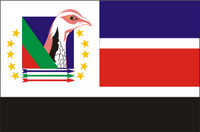This article needs to be updated. (July 2018) |
Mozambican National Resistance Resistência Nacional Moçambicana | |
|---|---|
 | |
| Abbreviation | RENAMO |
| Leader | Ossufo Momade |
| Chairman | André Magibire |
| Founded | 1975 |
| Headquarters | Avenida Ahmed Sekou Touré Nº 657, Maputo |
| Youth wing | RENAMO Youth League |
| Ideology | Mozambican nationalism Conservatism Economic liberalism Anti-communism |
| Political position | Centre-right[1] to right-wing[2] |
| Continental affiliation | Democrat Union of Africa |
| International affiliation | Centrist Democrat International (observer)[3] |
| Assembly of the Republic | 60 / 250
|
| Party flag | |
 | |
| Website | |
| www | |
RENAMO (from the Portuguese Resistência Nacional Moçambicana, lit. 'Mozambican National Resistance') is a Mozambican political party and militant group. The party was founded with the active sponsorship of the Rhodesian Central Intelligence Organisation (CIO) in May 1977 from anti-communist dissidents opposed to Mozambique's ruling FRELIMO party.[4] RENAMO was initially led by André Matsangaissa, a former senior official in FRELIMO's armed wing, and was composed of several anti-communist dissident groups which appeared immediately prior to, and shortly following, Mozambican independence.[5][6] Matsangaissa, who died in 1979, was succeeded by Afonso Dhlakama, who led the organization until he died in 2018.[7][8] He was succeeded by Ossufo Momade.[9]
Critics of RENAMO frequently described the movement as a proxy of Rhodesia and South Africa's apartheid government.[10] It has been theorised that RENAMO was formed for the sole purpose of countering FRELIMO support for the Zimbabwe African National Liberation Army (ZANLA).[11] On the other hand, RENAMO was also reflective of FRELIMO's own splintering support base and dwindling popularity in the immediate post-independence era.[6] Its political programme centered around the abandonment of FRELIMO's socialist policies, the adoption of a free market economy, and more traditionalist concerns such as the reinstatement of tribal leaders to positions of authority.[12] RENAMO's ranks included a number of Mozambican political exiles who genuinely opposed FRELIMO on principle, including FRELIMO defectors disillusioned with its Marxist–Leninist ideology, but also large numbers of recruits conscripted by force.[13]
With Rhodesian support, RENAMO commenced an insurgency against the FRELIMO government in 1977, sparking the Mozambican Civil War.[4] The war was characterised by severe human rights violations on both sides and crippled the already debilitated Mozambican economy.[13] RENAMO and FRELIMO acceded to the Rome General Peace Accords in October 1992, which ended FRELIMO's one-party state and introduced multi-party democratic elections.[12] In return, RENAMO pledged to abandon its armed struggle and conduct its future activities by political means within the framework of the new electoral system.[12] Following the end of the war, RENAMO was responsible for promoting constitutional reforms as well as the promotion of a strong domestic private sector.[14]
Renewed clashes broke out between RENAMO's militant forces and the FRELIMO government in 2013.[15][16] RENAMO resumed its insurgency, citing state corruption and electoral fraud perpetuated by FRELIMO officials.[15] A second peace agreement was reached between RENAMO and FRELIMO in August 2019, resulting in the virtual end of the insurgency.[17][9] A RENAMO splinter group known as the RENAMO Military Junta (RMJ) was quickly formed from party dissidents opposed to the peace process; the RMJ continued to carry out minor guerrilla operations until December 2021, when the last of its members surrendered to Mozambican security forces.[18]
- ^ Kadima, Denis (1 June 2014). "An introduction to the Politics of Party Alliances and Coalitions in Socially-divided Africa". Journal of African Elections. 13 (1): 1–24. doi:10.20940/jae/2014/v13i1a1. ISSN 1609-4700.
- ^ ""Em Moçambique só há partidos de direita": uma entrevista com Michel Cahen. MACEDO, Victor Miguel Castillo de; MALOA, Joaquim – Revista do Programa de Pós‑Graduação em Sociologia da USP" (PDF). Archived from the original (PDF) on 11 December 2013.
- ^ "Partidos Archivo – idc-cdi". Retrieved 24 April 2017.
- ^ a b Hall, Margaret; Young, Thomas (1997). Confronting Leviathan: Mozambique since independence. Athens: Ohio University Press. pp. 117–120. ISBN 0-8214-1191-8.
- ^ "Binding Memories: Chronology". Retrieved 28 December 2014.
- ^ a b Emerson 2014, pp. 74–110
- ^ "Afonso Dhlakama, Mozambique's Opposition Leader, Dies at 65". Bloomberg L.P. 3 May 2018.
- ^ "Chronology: Main dates in the life of Renamo leader Afonso Dhlakama". Club of Mozambique.
- ^ a b "Mozambique rivals sign peace deal". 8 August 2019.
- ^ "Renamo, Malawi and the struggle to succeed Banda: Assessing theories of Malawian intervention in the Mozambican Civil War" (PDF). arts.monash.edu.au. 11 November 2009. Archived from the original (PDF) on 28 March 2012. Retrieved 8 March 2016.
- ^ "Key Actors in the War and Peace Process" (PDF). Conciliation Resources. January 1998. Archived from the original (PDF) on 9 March 2016. Retrieved 8 March 2016.
- ^ a b c Alden, Christopher (2001). Mozambique and the Construction of the New African State: From Negotiations to Nation Building. Basingstoke: Palgrave. pp. 15–31. ISBN 0-312-23594-1.
- ^ a b Watch, Human Rights (1992). Conspicuous destruction: war, famine and the reform process in Mozambique. New York u.a.: Human Rights Watch. pp. 86–88. ISBN 978-1-56432-079-7.
- ^ "Main Renamo Policy Guidelines" (PDF). RENAMO-UNIÃO ELEITORAL. 2004. Archived from the original (PDF) on 10 June 2015. Retrieved 8 March 2016.
- ^ a b "Mozambique army destroys rebel base: police". Cape Town: South African Associated Press. 12 September 2016. Archived from the original on 24 September 2016. Retrieved 29 September 2016.
- ^ "Mozambique: Renamo Kills Mozambican Soldiers in Zambezia". allAfrica. Archived from the original on 30 September 2014. Retrieved 15 August 2014.
- ^ "Mozambique President, Opposition Leader Sign Peace Agreement". Voice of America. August 2019. Archived from the original on 28 February 2021.
- ^ "Mozambique: End of Renamo Military Junta, says UN envoy – AIM". Club of Mozambique. 3 December 2021. Archived from the original on 19 June 2022. Retrieved 17 February 2022.